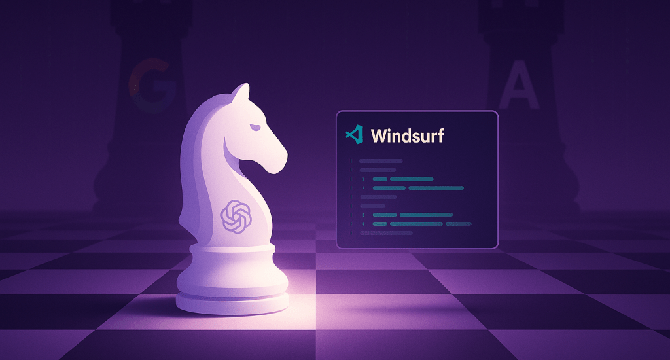VentureBeat
7d
374

Image Credit: VentureBeat
OpenAI’s $3B Windsurf move: the real reason behind its enterprise AI agent code push
- OpenAI is in a high-stakes race to defend its territory and conquer new frontiers in AI-powered coding, reflected in its reported acquisition of Windsurf for $3 billion.
- The urgency for OpenAI arises from challenges posed by Google and Anthropic to secure a dominant position in the emerging agentic AI world.
- This acquisition highlights OpenAI's imperatives to enhance developer ecosystem coding capabilities and become the primary interface for a future shaped by autonomous AI agents.
- OpenAI faces stiff competition from Google and Anthropic in enterprise AI, especially in AI-assisted coding where new platforms like Windsurf and Cursor are gaining popularity.
- Windsurf, known for its advanced IDE features, becomes crucial for OpenAI to compete and fortify its position against rivals by offering a user base advantage.
- OpenAI's strategic adjustments, including a shift back to a public benefit company structure and its increasing need to secure direct developer channels, are evident in response to the evolving AI landscape.
- The race towards dominating AI-assisted coding emphasizes capturing the developer workflow, with Windsurf providing strong foothold potential for OpenAI against competitors.
- The intense focus on coding tools is part of a broader competition to become the primary interface in an increasingly agentic AI world, where owning the starting point is crucial.
- The shift towards agentic coding and an open ecosystem indicates a move towards more accessible AI-driven solutions for traditional coders and enterprise domain experts.
- Overall, the competition among industry leaders like OpenAI and Google to establish a dominant starting point is intertwined with the industry's push towards openness and interoperability.
- Technical decision-makers in the enterprise need to closely observe the evolving AI landscape and its implications on developer workflows and the adoption of agentic coding solutions.
Read Full Article
22 Likes
For uninterrupted reading, download the app